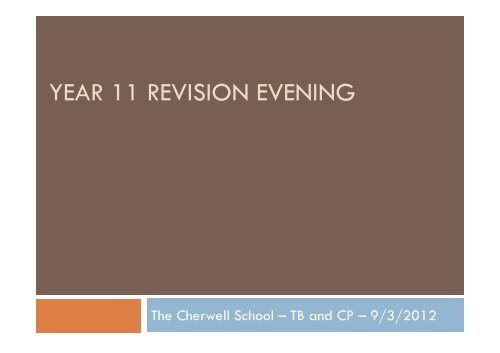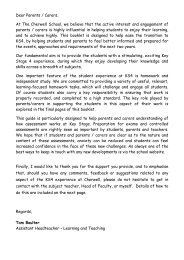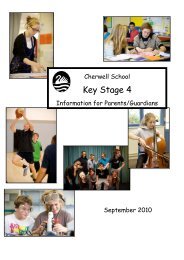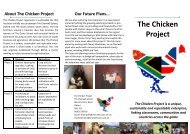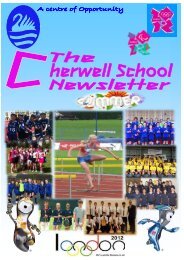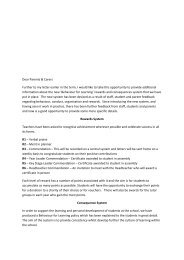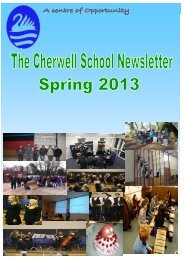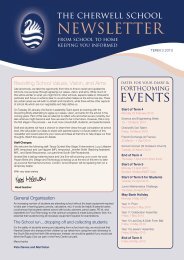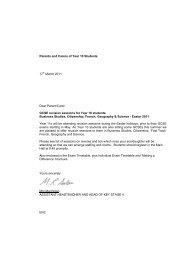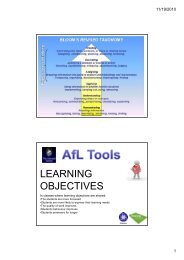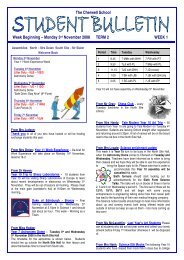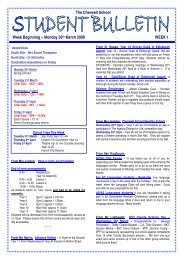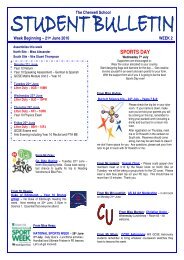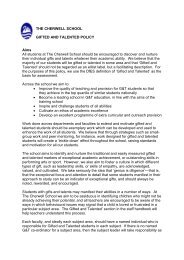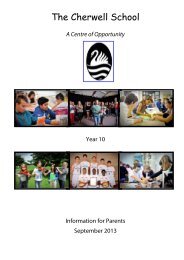YEAR 11 REVISION EVENING - Cherwell School
YEAR 11 REVISION EVENING - Cherwell School
YEAR 11 REVISION EVENING - Cherwell School
You also want an ePaper? Increase the reach of your titles
YUMPU automatically turns print PDFs into web optimized ePapers that Google loves.
<strong>YEAR</strong> <strong>11</strong> <strong>REVISION</strong> <strong>EVENING</strong><br />
The <strong>Cherwell</strong> <strong>School</strong> – TB and CP – 9/3/2012
Aims of the meeting<br />
1. To provide a timeline of action between now and<br />
final exams<br />
2. To explain the approach to revision we will be<br />
following in school<br />
3. To provide some key messages to support parents<br />
through the revision period<br />
4. To update you in relation to resources with a<br />
particular emphasis on E-Learning
TIMELINE<br />
Most subjects still completing course content<br />
t<br />
From Monday 19 th March<br />
A two week revision focus in assemblies and tutor time.<br />
Easter Revision<br />
Revision sessions over 3 mornings - Monday 2 nd to Wednesday 4 th<br />
April.<br />
Return to school- All lessons now revision lessons<br />
Monday 14 th May - First exam<br />
Thursday 31 st May – Leavers’ assembly<br />
June holiday (Monday 4 th June to Friday 8 th June)<br />
Monday <strong>11</strong> th June – <strong>School</strong> restarts<br />
Wednesday 27 th June- Final exam
Easter Break<br />
Monday <strong>11</strong> th April – Tuesday 26 th April<br />
Revision sessions<br />
available in school on<br />
Monday 2nd Tuesday<br />
3rd and Wednesday 4th<br />
April
A realistic work schedule for the<br />
Spring break…<br />
<br />
<br />
<br />
15 days available from Monday 2 nd April<br />
Take out Good Friday, Easter Monday and either Saturday/Sunday in both<br />
weekends…leaves <strong>11</strong> days<br />
Take out the three days which are set aside for scheduled revision in<br />
school…leaves 8 days.<br />
Divide the remaining 8 days into 3 sessions (a morning session from 10-12,<br />
an afternoon session from 12-2 and an evening session from 6-8) the<br />
student commits to focussing on their schoolwork for two of the three<br />
sessions.<br />
<br />
They then produce a written timetable which takes into account everything<br />
they need to do
Morning Afternoon Evening<br />
Thursday 5 th April French English<br />
Saturday 7 th April Maths Science<br />
Tuesday 10 th April History Business Studies<br />
Wednesday <strong>11</strong> th April<br />
Thursday 12 th<br />
April<br />
Friday 13th<br />
April<br />
Sunday 15 th April<br />
Monday 16 th April
Check on<br />
notes / books<br />
Revision<br />
guides<br />
Timetable<br />
What could<br />
you do now?<br />
Encourage! Discussion /<br />
ask questions<br />
Encourage to<br />
work hard<br />
Encourage to<br />
ask for help
Key Questions you could ask...<br />
1. How are you going to learn this?<br />
2. How do you do well in the exam (not, what do you<br />
have to do)? What is the examiner looking for?<br />
3. What personal feedback have you had? How are<br />
you going to act on it?<br />
4. What resources do you need?<br />
5. When do you plan to revise?
45 minutes at<br />
a time<br />
Work with<br />
others<br />
Avoid just reading<br />
– be active and<br />
have outcomes<br />
Practical<br />
Revision tips<br />
Find out which<br />
technique suits<br />
Resource –<br />
pens, card,<br />
post-its etc<br />
Practice – repeat<br />
topics, do sample<br />
questions<br />
Be specific in<br />
what you<br />
revise<br />
Get rewards
Traffic Lighting Exercise<br />
<br />
<br />
<br />
<br />
Students use a copy of the<br />
Subject exam content<br />
Underline in green the skills<br />
and content they are<br />
confident about<br />
Underline in orange the skills<br />
and content they are unsure<br />
about<br />
Underline in red the skills<br />
and content they are<br />
struggling with
A revision approach...<br />
Simplify<br />
Reduce<br />
Explode<br />
Test
Motivation<br />
What are we telling the students about motivation,<br />
achievement and engagement?
Why are some people so successful at<br />
school?<br />
Fixed Mindset<br />
• Ability is<br />
largely<br />
natural –<br />
people are<br />
just born that<br />
way<br />
Growth<br />
Mindset<br />
• Ability is<br />
something that<br />
is grown and<br />
developed d –<br />
they’ve learnt<br />
to be good
Growth vs Fixed Mindset<br />
Fixed Mindset<br />
Growth Mindset<br />
• If I find something<br />
difficult, I’m not<br />
clever!<br />
• Why put the<br />
effort in, when<br />
other people are<br />
just naturally<br />
better?<br />
• If I find something<br />
difficult, it’s<br />
because I’ve not<br />
(yet) learnt how<br />
to do it!
Examples of Fixed Mindset thinking<br />
I’m just no good at... Art / maths / music / writing /<br />
History / exams / getting on with others etc etc etc<br />
etc<br />
If I can’t do it right straight away, I must be no good<br />
I’m good at English ...<br />
<br />
......(and if one day I find something in English challenging, that’s<br />
a serious blow to my self-esteem, because it turns out I’m not as<br />
good as everyone thinks)
How do you get good at stuff?<br />
Believe that you can<br />
Work hard, work<br />
smart<br />
Take opportunities<br />
i<br />
Get help – training,<br />
teaching, feedback
The equation for success?<br />
•Teaching<br />
1<br />
•Opportunity<br />
2<br />
•Focused Effort<br />
3
A note on failure / getting it wrong...<br />
Successful learners get things wrong<br />
What matters is your response<br />
Watch the guy with the skateboard
Common responses to ‘GIW’…<br />
Frustration?<br />
Anger?<br />
Shame?<br />
Inadequacy?<br />
Disengagement?<br />
g
Growth mindset responses to ‘getting it<br />
wrong’<br />
‘GIW’ is a necessary<br />
part of learning<br />
‘GW’ ‘GIW’is an<br />
opportunity<br />
‘GIW’ can be<br />
overcome<br />
‘GIW’ just means you<br />
haven’t learnt it yet.
www.youtube.com/cherwellonline
E-Learning – youtube.com/cherwellonline<br />
Opportunities<br />
Anywhere / anytime<br />
Engaging g g and clear<br />
Re-usable<br />
Pause-ableable<br />
Take care...<br />
Can be passive<br />
Watching isn’t<br />
(necessarily) learning<br />
Need to be used as a<br />
revision tool, not as<br />
revision in itself
<strong>School</strong> contacts<br />
<br />
<br />
General enquiries<br />
office@cherwell.oxon.sch.uk<br />
<br />
<br />
Mr Chris Price, Deputy Headteacher x200<br />
cprice@cherwell.oxon.sch.uk<br />
<br />
<br />
Ms Barb Timms, Deputy Headteacher x306<br />
btimms@cherwell.oxon.sch.uk<br />
Mr Pete Davies, Assistant Headteacher x3<strong>11</strong><br />
<br />
pdavies@cherwell.oxon.sch.uk<br />
h <br />
<br />
Dr Martha Hawes, Head of Year x244<br />
mhawes@cherwell.oxon.sch.uk<br />
<br />
<br />
Mrs Coralie Goble, Deputy Head of Year x244<br />
cgoble@cherwell.oxon.sch.uk<br />
<br />
Mrs Nicky Murray, Examinations officer x223 nmurray@cherwell.oxon.sch.uk


